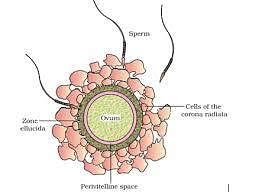NEET Exam > NEET Tests > Biology Class 12 > Test: Fertilisation - NEET MCQ
Test: Fertilisation - NEET MCQ
Test Description
10 Questions MCQ Test Biology Class 12 - Test: Fertilisation
Test: Fertilisation for NEET 2024 is part of Biology Class 12 preparation. The Test: Fertilisation questions and answers have been
prepared according to the NEET exam syllabus.The Test: Fertilisation MCQs are made for NEET 2024 Exam. Find important
definitions, questions, notes, meanings, examples, exercises, MCQs and online tests for Test: Fertilisation below.
Solutions of Test: Fertilisation questions in English are available as part of our Biology Class 12 for NEET & Test: Fertilisation solutions in
Hindi for Biology Class 12 course. Download more important topics, notes, lectures and mock
test series for NEET Exam by signing up for free. Attempt Test: Fertilisation | 10 questions in 10 minutes | Mock test for NEET preparation | Free important questions MCQ to study Biology Class 12 for NEET Exam | Download free PDF with solutions
Detailed Solution for Test: Fertilisation - Question 1
Detailed Solution for Test: Fertilisation - Question 2
| 1 Crore+ students have signed up on EduRev. Have you? Download the App |
Detailed Solution for Test: Fertilisation - Question 3
Detailed Solution for Test: Fertilisation - Question 4
Test: Fertilisation - Question 5
What is the correct order of travel of sperm through the female reproductive tract before it reaches the egg?
Detailed Solution for Test: Fertilisation - Question 5
Test: Fertilisation - Question 6
What is the order of layers or spaces from outside to inside of ovum?
Detailed Solution for Test: Fertilisation - Question 6
Detailed Solution for Test: Fertilisation - Question 7
Test: Fertilisation - Question 8
The fusion of haploid sperm and egg nuclei during fertilization leads to formation of a __________
Detailed Solution for Test: Fertilisation - Question 8
Test: Fertilisation - Question 9
Which of the following is the correct number of chromosomes based on the cell type?
Detailed Solution for Test: Fertilisation - Question 9
Test: Fertilisation - Question 10
Consider the following two statements:
I. Not all copulations lead to fertilization and pregnancy
II. Fertilization can occur if the ovum and the sperms are simultaneously transported to the ampullary - isthmic junction.
Detailed Solution for Test: Fertilisation - Question 10
|
86 videos|294 docs|184 tests
|
Information about Test: Fertilisation Page
In this test you can find the Exam questions for Test: Fertilisation solved & explained in the simplest way possible.
Besides giving Questions and answers for Test: Fertilisation, EduRev gives you an ample number of Online tests for practice


















